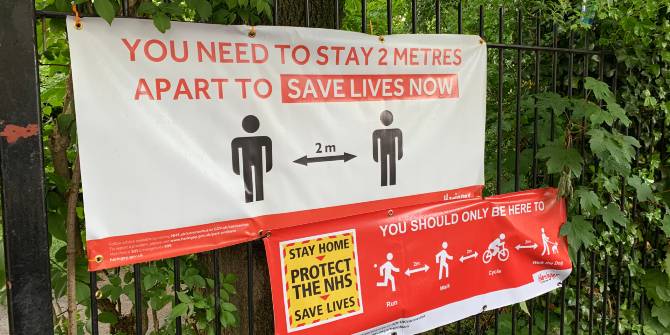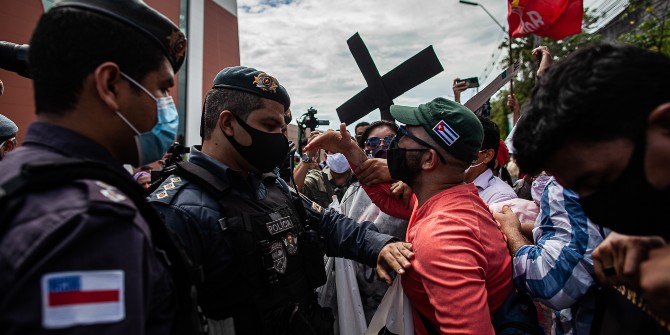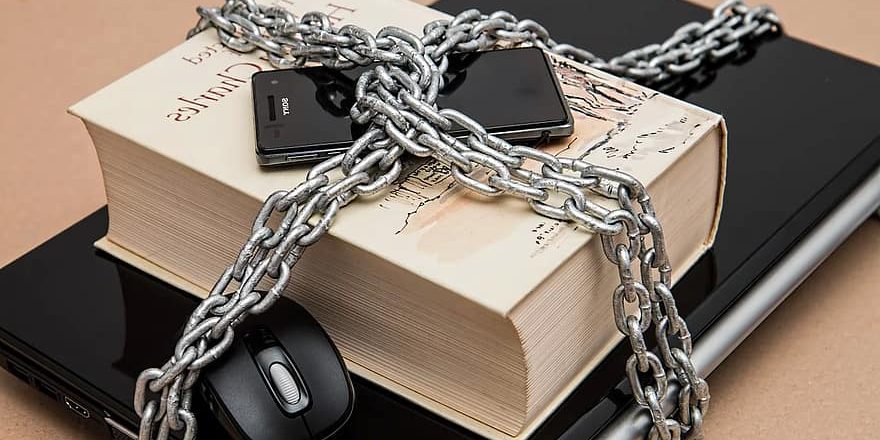What do people think about pandemic policing? Should the police get extra powers to enforce the lockdown? A survey by Krisztián Pósch (LSE), Julia Yesberg (UCL), Jonathan Jackson (LSE), Ben Bradford (UCL), Arabella Kyprianides (UCL) and Zoe Hobson (UCL) found some measures (such as checkpoints and issuing fines) are much more popular than others (like mobile phone and facial recognition tracking). Importantly, people’s perception of the legitimacy of the police is crucial in establishing public consent for enhanced police powers. In turn, legitimacy is rooted in people’s experience of everyday policing.
In the face of the COVID-19 outbreak, many countries have introduced emergency powers curbing civic freedoms and human rights to get to grips with the pandemic. Naturally, enforcement of these legislations falls onto the most visible representatives of the justice system: the police.

In the UK, the College of Policing advised police officers to adopt a ‘four E’ approach to the enforcement of the coronavirus legislation. First, ‘Engage’ with the public, ask them why they are out and about and listen to their responses. Second, ‘Explain’ the social distancing regulations and why they are in place (e.g., risks to public health and protecting the NHS). Third, the officer should ‘Encourage’ individuals to follow the regulations and ask them to return home if they have no reasonable grounds to be out. Finally, as a last resort, officers may ‘Enforce’ the law, fining people for breaching the legislation and using force to take the individuals home.
Recent public polling carried out by YouGov for Crest Advisory indicated that this Engage, Explain, Encourage, and Enforce approach has been successful: approximately three-quarters of the public was supportive of the way the police have handled the lockdown. However, this poll also indicated that around 15% of the population wanted the police to take ‘tougher action’ to ensure public compliance. Conversely, 6% had the opposite opinion, finding police enforcement too heavy-handed.
At least some elements of the lockdown will probably remain in place for the foreseeable future, yet some changes to the coronavirus legislation are likely in the coming months as certain elements of the lockdown are eased. Explaining the laws may become challenging for the police and the public if they change over time. In Wales, for instance, changes to the coronavirus legislation came into effect on 25 April. These new rules mean that the public can only exercise ‘as close as possible’ and cycle ‘within reasonable walking distance’ of their home, effectively prohibiting driving somewhere to exercise. Explaining change is also made more difficult by Home Office practice where substantive alterations to the content of the legislation are made without parliamentary scrutiny, potentially posing questions about the constitutionality of the procedures.
Partly in preparation for potential future changes to police powers, we recently conducted a survey to examine people’s views on emergency police powers that have been, or could be, granted to UK police forces. Given the significant possibility that the lifting of the lockdown will be both phased and complicated, we were interested in both the scale of the public support of existing and new measures and the underlying drivers of this support.
Our longitudinal study
Our longitudinal study recruited 1,200 people from London and nine metropolitan areas in the UK on the online platform Prolific Academic. We sampled 300 people from London and 100 people each from nine metropolitan areas: Birmingham, Cardiff, Edinburgh, Glasgow, Leeds, Liverpool, Manchester, Newcastle, and Sheffield. The first wave of our longitudinal study was collected on 21 April; the participants will receive similar surveys every three weeks in the coming months. Although our sample is big, it is a convenience sample, which means that it is not representative of the 10 cities (although we calculated quota weights for gender and age and used these weights when estimating the results presented below).
What powers do the public support?
We presented participants with seven police powers and asked them to rate their support for each one (Table 1). The power that had the strongest support was making it a criminal offence to spread false information (75% either supported or strongly supported it). Curtailing freedom of expression in this way has been mostly adopted by countries known for their authoritarian tendencies, such as Hungary, Turkey, and Egypt. Some critics of these powers have called these legislations a ‘censorship pandemic’ that can be easily exploited to crack down on political opponents, the media, and minorities.
Three powers represent police enforcement of certain aspects of social distancing. Setting up checkpoints during the lockdown had the highest percentage of support (75%), followed by issuing fines (65%), and using force (41%) against those who fail to follow social distancing legislation. Similar police powers have been adopted by most countries around the world. In the UK, officers can issue on-the-spot fines to enforce social distancing rules (£60 for the first fine, £30 if paid within 14 days, otherwise doubling for each subsequent offence up to a maximum of £960). Singapore has introduced one of the toughest measures, where someone violating a stay at home order can be jailed for up to six months. Based on this law, a man has been recently sentenced to 14 days in jail for enjoying a pork rib soup.
The final three powers relate to the use of modern technology for the surveillance and tracking of individuals. These powers had the lowest level of support in the sample, with 30% supporting the use of drones, 21% the use of facial recognition, and 21% the police tracking of mobile phones. China, for instance, has developed a facial recognition technology that can take the temperature of people and identify them even when they are wearing a face mask. China also introduced a mandatory phone app that shares data with police. Until recently, the Israeli police have used mobile-phone location data to identify people violating quarantine guidelines.
Table 1: Public support for emergency police powers (%)
| Construct | Items | Oppose or strongly oppose | Undecided | Support or strongly support |
|---|---|---|---|---|
| Expression | Make it a criminal offence to spread false information about contagious diseases | 10 | 15 | 75 |
| Enforcement | Issue an on-the-spot fine to people they find out of their homes without justification | 20 | 15 | 65 |
| Use force to make people return to their homes if they are out without justification | 37 | 22 | 41 | |
| Surveillance | Use drones to track people's movements to ensure they socially isolate | 50 | 20 | 30 |
| Use facial recognition technology to track people who are out of their homes | 59 | 20 | 21 | |
| Track people's mobile phones to ensure they are only out of their home for a good reason | 64 | 15 | 21 |
Why do people support the use of new police powers?
In addition to understanding what powers people support, we were also interested in why certain people are supportive or opposed to these police powers. Prior research has shown that Londoners who saw the police as legitimate also tended to be reassured that a new power like Live Facial Recognition will be used in the correct way and not abused.
People who view the police as legitimate accept their right to determine what is appropriate and acceptable. Crucially, the evidence overwhelmingly supports the idea that police legitimacy is rooted in people’s direct and indirect contact with officers, particularly whether those officers act in respectful ways and make neutral and accountable decisions as they engage in everyday policing.
What about public support for different new police powers to monitor and enforce lockdown? We fitted a multivariate model with factors measuring the demographic characteristics of the individual, how their life was affected by the coronavirus outbreak, their concerns and expectations regarding the virus, their experience with the police, and the legitimacy they granted to the police.
Police legitimacy has two main components. The first one taps into people’s perception of whether the police act in normatively appropriate ways, make decisions and treat people based on societally shared moral values. This aspect of legitimacy is called ‘normative alignment’ — it is the perceived value congruence between the individual and the police in their community. The second aspect of legitimacy represents people’s internalised ‘duty to obey’ the police. This duty is based on willing consent, whereby people feel a moral obligation to obey the police and grant them the right to dictate appropriate behaviour.
Our findings suggest that support for enhanced enforcement- and surveillance-related powers is rooted in demographic characteristics, past experiences with the police, and outbreak-related concerns and experiences. Yet perceived legitimacy played an outsized role: people support increased police powers when they generally grant police the right to determine what is appropriate and acceptable, and believe they abide by shared norms and values.
This suggests that to make the new police powers more acceptable to the public, it is essential for the police to communicate shared values and seek public consent for their actions. If police and policymakers wish to ‘take people with them’ as they push for extras powers and technological abilities in the time of a pandemic, then the mundane activity of everyday police work (‘low’ policing) may have important implications for the public acceptance or rejection of novel technologies working more towards the ‘high’ end of policing. Paradoxically, if the police are to get public approval for new intrusive powers, it is vital that they stick to their current ‘enforcement as last resort’ policy of light-touch policing.
One of the most pressing questions that remains is whether these enhanced police powers are supported in the long run. The prolonged lockdown and its economic consequences could erode police legitimacy and, as a consequence, public support for enhanced police powers might wane. Crucially, these are results from the first wave of our longitudinal survey and we hope to answer this very question in the near future.
This post represents the views of the authors and not those of the COVID-19 blog, nor LSE.
Zoe Hobson, a Researcher in the Department of Security and Crime Science at UCL, is an additional author.






In response to your article – What makes Britons trust police to enforce the lockdown fairly? I wondered if you were planning to update this article with the latest results?